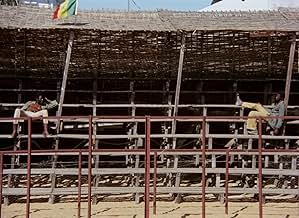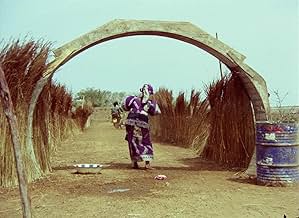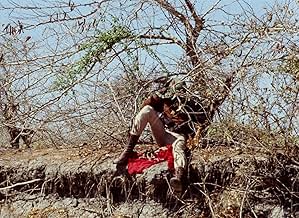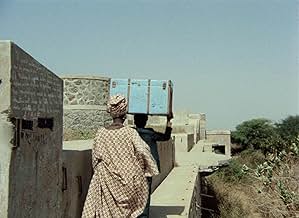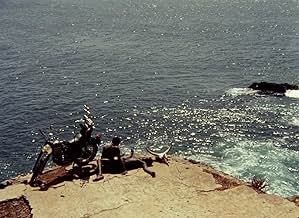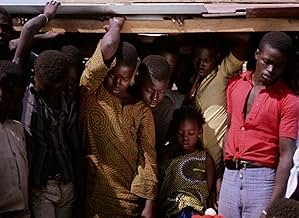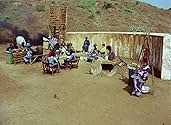IMDb-BEWERTUNG
7,0/10
4426
IHRE BEWERTUNG
Der Viehhirte Mory und die Studentin Anta versuchen, genügend Geld zusammenzubekommen, um nach Paris gehen und ihre langweilige Vergangenheit hinter sich lassen zu können.Der Viehhirte Mory und die Studentin Anta versuchen, genügend Geld zusammenzubekommen, um nach Paris gehen und ihre langweilige Vergangenheit hinter sich lassen zu können.Der Viehhirte Mory und die Studentin Anta versuchen, genügend Geld zusammenzubekommen, um nach Paris gehen und ihre langweilige Vergangenheit hinter sich lassen zu können.
- Regie
- Drehbuch
- Hauptbesetzung
- Auszeichnungen
- 2 Gewinne & 1 Nominierung insgesamt
Myriam Niang
- Anta
- (as Mareme Niang)
Josephine Baker
- Joséphine Baker
- (Synchronisation)
- (as Joséphine Baker)
Empfohlene Bewertungen
The first important thing to say is that I hope that no animals are ill treated or killed in the course of filming which is unacceptable and strictly forbidden. The images are powerful indeed in terms of scenes, surroundings and people's faces, bodies, expressions and behaviours. The action takes place in Senegal and the story is simple and well shown. A cow herd and a university student are longing to leave Senegal and emigrate to Paris. They try to succed in that by doing a lot of things including stealing money from other people to pay for a ship travel to France. Through it we see and are aware of the life and usages of the Sebegalese lower social class. All well filmed, directed and acted. And last but not least we listen on the background part of a Parisian song by the beautiful voice of Josephine Baker.
Mory, a cowherd, and Anta, a university student, try to make money in order to go to Paris and leave their boring past behind.
This film looks great and is just very interesting from the whole clash of cultures perspective. You have some African tradition here, and mixed in with that you have some Muslim practices. I am no expert, but I suspect Islam in Senegal is much different than in the Middle East. It's an interesting blend. And then, of course, you have the modern world of France, which is different from either of those cultures.
What may strike viewers the most, especially because it happens so early in the film (and is repeated later), is the slaughter of the cattle. Whether the methods shown are humane or not, I have no idea. But they look brutal, and to the modern world it may be a shock to see something that has become so far removed from our everyday life. Now, food is food, and we rarely see that once upon a time it was a living thing.
This film looks great and is just very interesting from the whole clash of cultures perspective. You have some African tradition here, and mixed in with that you have some Muslim practices. I am no expert, but I suspect Islam in Senegal is much different than in the Middle East. It's an interesting blend. And then, of course, you have the modern world of France, which is different from either of those cultures.
What may strike viewers the most, especially because it happens so early in the film (and is repeated later), is the slaughter of the cattle. Whether the methods shown are humane or not, I have no idea. But they look brutal, and to the modern world it may be a shock to see something that has become so far removed from our everyday life. Now, food is food, and we rarely see that once upon a time it was a living thing.
The story to this film is simple (maybe deceptively so), but it's told in an avant-garde way by Mambéty, and loaded with meaning. The premise is that a rebel and a university student have had enough of the traditional life in Dakar, and dream of escaping by ship to Paris. They get on his motorbike which is embellished with cow horns, and to the tune of Josephine Baker crooning "Paris, Paris," begin a series of misadventures on their way to the port.
The events that occur along the road trip, most involving theft or attempted theft, really aren't all that memorable, but the visuals that Mambéty and cinematographer Pap Samba Sow conjured up certainly were. Vibrant colors, rugged scenery, a photographer's eye for framing make for many gorgeous moments, pretty impressive for its limited budget. And yet, in stark contrast to the beauty in this land and its people, life is shown to be dirty, and a struggle. The film felt immersive into Senegal in a literal sense, but through its use of montages, fantasy, and misdirection, also immersive into the fractured mindset of its nonconformist protagonists.
Unfortunately, this immersion also includes some absolutely brutal scenes of animals being killed very early on - cattle in a slaughterhouse, as well as a goat out in a field. These go on for extended intervals, there is a lot of blood, and the animals are shown writhing in agony. Images from the slaughterhouse are reprised towards the end, giving it a larger point, that the young man is as trapped as those poor cows, which was a powerful moment, but I don't think the earlier scenes needed to have been as graphic as they were. It was nauseating to me, though admittedly my perspective is from a different culture, and one lucky enough to have the means to be vegetarian.
The film is made with artistry and style, but it's rooted in realism, and a reflection of the desire for a better life for the Senegalese. There isn't an overt argument made as to the devastating effects of colonialism that impoverished the country, but we do get a glimpse into the ugly attitudes of a French couple who have been teaching in Senegal for seven years, through this exchange:
"There's nothing to see in Senegal. Barren, intellectually as well." "Our salary is three times that of the Senegalese teachers, but they don't eat like we do. They're not as refined." "And what would we buy here? Masks? African art is a joke made up by journalists in need of copy."
Overall, despite its power and visual flair, I confess I admired this film more than I loved it. Aside from the animal slaughter (which may seriously turn you against the film on its own), the events on the road trip following that glorious scene on the flat rock with the sea churning below just weren't strong enough, and pacing was an issue. Worth seeing, just be prepared to avert your gaze in the beginning.
The events that occur along the road trip, most involving theft or attempted theft, really aren't all that memorable, but the visuals that Mambéty and cinematographer Pap Samba Sow conjured up certainly were. Vibrant colors, rugged scenery, a photographer's eye for framing make for many gorgeous moments, pretty impressive for its limited budget. And yet, in stark contrast to the beauty in this land and its people, life is shown to be dirty, and a struggle. The film felt immersive into Senegal in a literal sense, but through its use of montages, fantasy, and misdirection, also immersive into the fractured mindset of its nonconformist protagonists.
Unfortunately, this immersion also includes some absolutely brutal scenes of animals being killed very early on - cattle in a slaughterhouse, as well as a goat out in a field. These go on for extended intervals, there is a lot of blood, and the animals are shown writhing in agony. Images from the slaughterhouse are reprised towards the end, giving it a larger point, that the young man is as trapped as those poor cows, which was a powerful moment, but I don't think the earlier scenes needed to have been as graphic as they were. It was nauseating to me, though admittedly my perspective is from a different culture, and one lucky enough to have the means to be vegetarian.
The film is made with artistry and style, but it's rooted in realism, and a reflection of the desire for a better life for the Senegalese. There isn't an overt argument made as to the devastating effects of colonialism that impoverished the country, but we do get a glimpse into the ugly attitudes of a French couple who have been teaching in Senegal for seven years, through this exchange:
"There's nothing to see in Senegal. Barren, intellectually as well." "Our salary is three times that of the Senegalese teachers, but they don't eat like we do. They're not as refined." "And what would we buy here? Masks? African art is a joke made up by journalists in need of copy."
Overall, despite its power and visual flair, I confess I admired this film more than I loved it. Aside from the animal slaughter (which may seriously turn you against the film on its own), the events on the road trip following that glorious scene on the flat rock with the sea churning below just weren't strong enough, and pacing was an issue. Worth seeing, just be prepared to avert your gaze in the beginning.
I went to the London Film Festival in October 2008 to watch a film from the past, a "Treasure from the Archive". However whilst Touki Bouki was made over 35 years ago it still remains incredibly relevant. Young Africans still drown trying to cross the Straits of Gibraltar to Europe every day. That's what this film is about, the desperation of ordinary Africans (specifically from a Senegalese perspective) yearning to find prosperity and stability. It's one of those films I would class as a "scream of despair". Even if there are some very funny scenes, these scenes are like the scenes of humour that Ford would inject into his Westerns to mollify audience gloom. It would not surprise me if that were a direct influence, but if he wasn't cine-literate, then Djibril must rank as the most precocious director of all time.
The bare bones of the plot of the film concerns Mory, who is a sometime cattle herder, and Anta his girlfriend who is a university student. This especially winsome couple want desperately to escape to Europe. Mory is the object of ridicule in his community, intelligent, but useless and uppity, whilst Anta's university is no real safe-haven of learning, what with it being full of decadent revolutionaries (not an oxymoron). Both yearn to live in France.
As close to a true narrative as we get is that they go to a wrestling match and attempt to steal the stadium's cash box. There are two boxes, a yellow one and a blue one, they can't take both and aren't sure which one holds the loot. They take the blue one and when they get to their deserted, ruined, ex-colonial bunker hideout realise that it is filled with Voodoo craziness, runes and skulls and such. This for me is high Surrealism.
Plan B is to steal clothes, money, and a car off a rich idler who lives in a seaside villa surrounded by catamites. Plan B is successful, exeunt Mory and Anta pursued by the lo (sic).
Dressed as highfalutin dandies they revisit Mory's community driving in a stars-and-stripes festooned car where they are treated as a Lord and his Lady. Whether this is actual plotting or wish-fulfilment dreaming is left up to the viewer to decide.
After Fellinian parades of the mind the story returns to earth with a bump as Mory and Anta reach a port and try to escape to France.
One thing that stands out in the film is the anti-French criticism. The French bourgeois who make their living in Senegal are shown as treating Senegalese as some sort of bonobo-child chimeras. Also there is the aforementioned wrestling match, which is a "charity" event organised to raise money to build a statue of General de Gaulle (the height of absurdism?). This is also internally-driven criticism as the organisers are chiefs of a Senegalese tribe.
The film is ambivalent about life in Senegal, whilst Mory and Anta yearn to leave, Mambéty also shows us beautiful scenes of daily life in Senegal, and the humour of the populace. One part for me stands out, a parade of Senegalese carrying water on their heads in semi-transparent plastic buckets, the sunlight shining through the buckets transforms them into preternatural magic lanterns, the framing is exquisite, the camerashot is filled with green and blue corruscation. The point is that this guy Mambéty is not some sort of amateur who is esteemed out of political correctness, this guy is a force of nature, a director whose capability of expression is really begging to be called primus inter pares when compared to the likes of Parajanov and Bunuel.
One strong warning is that this movie contains scenes of cattle being slaughtered both in abbatoirs and outside of them, right at the start of the film. Really gruesome in the extreme, and far more graphic for example than the familiar scene of an ox being slaughtered in Apocalypse Now. The point of it is metaphorical, young African men are treated as no less than cattle to be slaughtered, fodder for the consumer games of power structures, ultimately commoditised.
The bare bones of the plot of the film concerns Mory, who is a sometime cattle herder, and Anta his girlfriend who is a university student. This especially winsome couple want desperately to escape to Europe. Mory is the object of ridicule in his community, intelligent, but useless and uppity, whilst Anta's university is no real safe-haven of learning, what with it being full of decadent revolutionaries (not an oxymoron). Both yearn to live in France.
As close to a true narrative as we get is that they go to a wrestling match and attempt to steal the stadium's cash box. There are two boxes, a yellow one and a blue one, they can't take both and aren't sure which one holds the loot. They take the blue one and when they get to their deserted, ruined, ex-colonial bunker hideout realise that it is filled with Voodoo craziness, runes and skulls and such. This for me is high Surrealism.
Plan B is to steal clothes, money, and a car off a rich idler who lives in a seaside villa surrounded by catamites. Plan B is successful, exeunt Mory and Anta pursued by the lo (sic).
Dressed as highfalutin dandies they revisit Mory's community driving in a stars-and-stripes festooned car where they are treated as a Lord and his Lady. Whether this is actual plotting or wish-fulfilment dreaming is left up to the viewer to decide.
After Fellinian parades of the mind the story returns to earth with a bump as Mory and Anta reach a port and try to escape to France.
One thing that stands out in the film is the anti-French criticism. The French bourgeois who make their living in Senegal are shown as treating Senegalese as some sort of bonobo-child chimeras. Also there is the aforementioned wrestling match, which is a "charity" event organised to raise money to build a statue of General de Gaulle (the height of absurdism?). This is also internally-driven criticism as the organisers are chiefs of a Senegalese tribe.
The film is ambivalent about life in Senegal, whilst Mory and Anta yearn to leave, Mambéty also shows us beautiful scenes of daily life in Senegal, and the humour of the populace. One part for me stands out, a parade of Senegalese carrying water on their heads in semi-transparent plastic buckets, the sunlight shining through the buckets transforms them into preternatural magic lanterns, the framing is exquisite, the camerashot is filled with green and blue corruscation. The point is that this guy Mambéty is not some sort of amateur who is esteemed out of political correctness, this guy is a force of nature, a director whose capability of expression is really begging to be called primus inter pares when compared to the likes of Parajanov and Bunuel.
One strong warning is that this movie contains scenes of cattle being slaughtered both in abbatoirs and outside of them, right at the start of the film. Really gruesome in the extreme, and far more graphic for example than the familiar scene of an ox being slaughtered in Apocalypse Now. The point of it is metaphorical, young African men are treated as no less than cattle to be slaughtered, fodder for the consumer games of power structures, ultimately commoditised.
Two young people attempt to escape the poverty of their native Senegal and move to Paris. They raise some funds by committing petty crimes.
Touki Bouki is a very distinctive film that's for sure. The African continent hasn't been renowned for producing a great deal of important movies but this one certainly qualifies as such. It has a pretty basic story-line but it's not a plot-driven affair at all really. In actual fact it is quite experimental in approach much of the time and seems to have been influenced by the European New Wave films quite a bit. But what gives it its edge is that within that it is very specifically Senegalese. It's not often we see much from this part of the world represented in cinema, especially not from over forty years ago and certainly rarely from actual Senegalese film-makers. It's this Senegalese colour and authenticity, combined with the bold experimental cinematic presentation that makes this one very much stand out. In truth, I don't think I fully appreciated all its nuances on first viewing and would certainly like to return to it sometime in the future. Be warned though, it does contain some pretty brutal scenes of animal slaughter which make for difficult viewing. All-in-all though, this unusual film has a great deal of character and its strong sense of location makes for fascinating viewing.
Touki Bouki is a very distinctive film that's for sure. The African continent hasn't been renowned for producing a great deal of important movies but this one certainly qualifies as such. It has a pretty basic story-line but it's not a plot-driven affair at all really. In actual fact it is quite experimental in approach much of the time and seems to have been influenced by the European New Wave films quite a bit. But what gives it its edge is that within that it is very specifically Senegalese. It's not often we see much from this part of the world represented in cinema, especially not from over forty years ago and certainly rarely from actual Senegalese film-makers. It's this Senegalese colour and authenticity, combined with the bold experimental cinematic presentation that makes this one very much stand out. In truth, I don't think I fully appreciated all its nuances on first viewing and would certainly like to return to it sometime in the future. Be warned though, it does contain some pretty brutal scenes of animal slaughter which make for difficult viewing. All-in-all though, this unusual film has a great deal of character and its strong sense of location makes for fascinating viewing.
Wusstest du schon
- WissenswertesThis film is believed to be Africa's first avant-garde film, although Soleil Ô (1970) could also make this claim.
- VerbindungenFeatured in Caméra d'Afrique (1983)
- SoundtracksParis, Paris, Paris
(Madrid) (uncredited)
Music by Agustín Lara
Spanish lyrics by Agustín Lara
French lyrics by Georges Tabet
Performed by Josephine Baker
Top-Auswahl
Melde dich zum Bewerten an und greife auf die Watchlist für personalisierte Empfehlungen zu.
- How long is Touki Bouki?Powered by Alexa
Details
Box Office
- Weltweiter Bruttoertrag
- 180 $
- Laufzeit1 Stunde 25 Minuten
- Sound-Mix
- Seitenverhältnis
- 1.37 : 1
Zu dieser Seite beitragen
Bearbeitung vorschlagen oder fehlenden Inhalt hinzufügen


